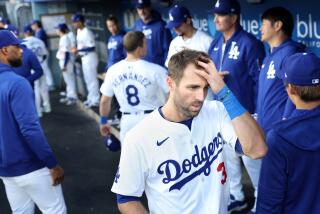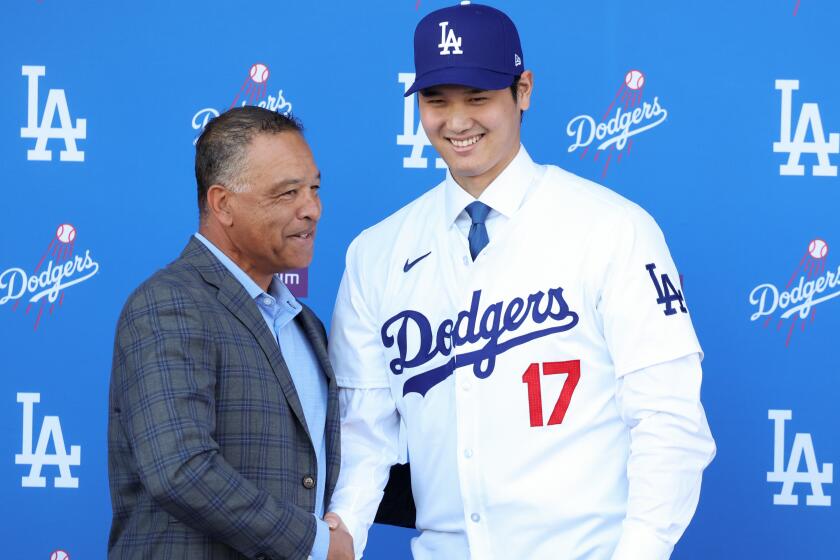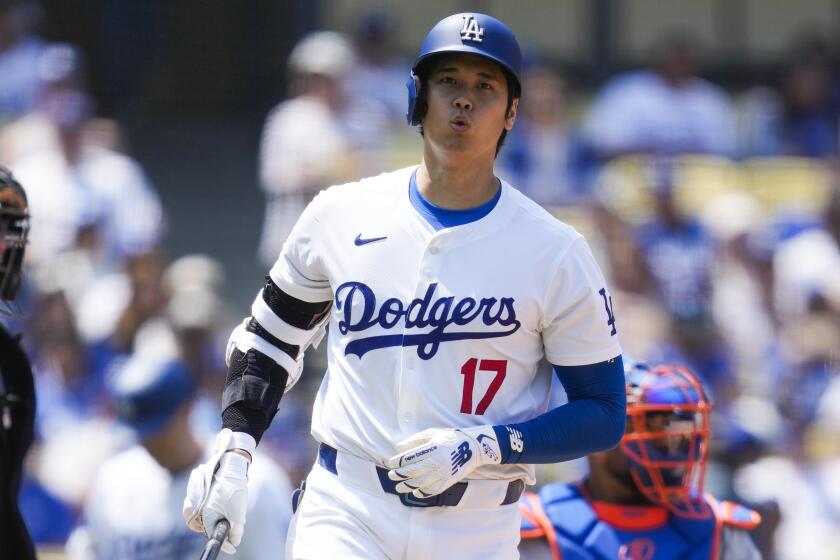For Dodgers’ Manny Ramirez, it’s been less funny, more business this spring
Bat in hand, headphones in his ears and sweat covering his face, Manny Ramirez walked across the Dodgers’ clubhouse on the last day of spring training in Arizona.
The locker room was nearly empty. A clock in the middle of the room indicated it was 8:42 a.m.
Avoiding eye contact and saying nothing, Ramirez headed toward a computer in the back of the room. The gray shirt he was wearing spoke for him.
“I got 99 problems but my swing ain’t one,” the shirt read, a play on words in the chorus of a Jay-Z song.
Ramirez hasn’t granted any substantive interviews in more than a month. He has continued to exchange pleasantries with some reporters, but has rarely said more than “No, thank you” or “No, gracias” when questioned about baseball.
Ramirez hasn’t explained his quiet — not to journalists, not to teammates or coaches either. “I don’t think Manny wants to be in the spotlight,” third base coach Larry Bowa said. “Manny likes to play the game, go home, sleep, get up, play the game.”
Manager Joe Torre offered a similar theory.
“I think he might be trying to stay in that place where he knows he needs to be to play baseball,” Torre said. “I think he realizes at this point in time he has to find out where his career is. If that’s the way he has to do it, that’s the way he has to do it.”
The Myth of Manny started to unravel last May when he was exposed as a drug cheat, suspended for 50 games and then experienced a humiliating second half of the season in which he looked nothing like the hitter who earned a dozen All-Star selections. Standing in the eye of a storm of controversy, Ramirez hit .255 with 10 home runs and 34 runs batted in over his last 68 games.
His performance was so substandard that when he predicted on the first day of camp that this season would be his last with the Dodgers, it came off like a face-saving gesture in anticipation of a decision the club would likely make for him next winter.
Ramirez turns 38 next month, and his two-year, $45-million contract expires at the end of the season.
No doubt aware that there were no serious bidders for his services outside of the Dodgers the last time he was a free agent — in the winter of 2008-09, when he was a year younger and coming off a spectacular half-season in L.A. — Ramirez also said this season could be his last in baseball, period.
However, there is no trace of compromise in his actions, according to his coaches and teammates.
The Ramirez they portray isn’t the self-absorbed clown in dreadlocks who stole headlines on the day he reported to camp and then went on a three-game exhibition tour in Taiwan last month against management’s wishes in order to collect $170,000 in appearance fees.
“He’s been far more focused this spring,” General Manager Ned Colletti said. “I sense a different determination and approach.”
Colletti said that’s the impression he got from listening to Ramirez in private conversations. Others said they got the same impression from watching him practice.
“His work is impeccable,” said Jeff Pentland, a hitting coach who works closely with Ramirez.
Pentland said Ramirez trained on off-days and was often at Camelback Ranch earlier than Pentland was this spring (the coach usually arrived about 6 a.m.), at least two hours before most of his teammates.
Those extra hours were spent in the weight room, out on the practice fields running or in the video room studying.
“He watches a lot of his swings from over the years,” Pentland said. “He’s very meticulous about the things he does.”
By the time most of the team started to file into the clubhouse, Ramirez was in the batting cages, usually accompanied by Pentland and hitting coach Don Mattingly. But sometimes he would be there with only utilityman Ronnie Belliard.
“We watch each other hit off the tee, and we learn from each other,” Belliard said. “He gives me advice, and I give him advice.”
Pentland was mostly an observer whose role was limited to helping Ramirez with soft-toss drills.
“He’s very, very smart about his business,” Pentland said.
Garret Anderson, a three-time All-Star and 16-year veteran in his first spring with the Dodgers, said he noticed that Ramirez was extremely disciplined during batting practice.
“He makes sure he’s not taking swings he doesn’t take in the game,” Anderson said.
Anderson wasn’t surprised when he saw firsthand how dedicated Ramirez is to his craft.
“You can’t sustain that kind of level of play for as long as he has without working. You can’t do it,” Anderson said. “To play into your mid-30s, you have to take care of your body, you have to work at it.”
The result of the work was a Ramirez whom both Pentland and Mattingly described as being better balanced at the plate this spring.
“I’ve seen a guy who knows what he needs to do,” Torre said. “He came here knowing what he had to do and worked on it before he got here as far as the mechanics were concerned. He’s going to be a productive hitter.”
Leadoff batter Rafael Furcal said he has no doubt Ramirez will hit .300 and drive in 100 runs.
Pentland offered this story from his days as a hitting coach with the Seattle Mariners as a warning to opponents:
“We’d come in and he’d be swinging terrible,” Pentland said of Ramirez. “Pitchers would be bragging how they got him out. The next series, they couldn’t get him out.
“So he’s very good at adjusting and adapting to a situation. I think that’s what you’re going to see.”
More to Read
Are you a true-blue fan?
Get our Dodgers Dugout newsletter for insights, news and much more.
You may occasionally receive promotional content from the Los Angeles Times.






